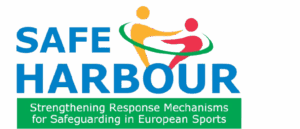International Biathlon Union
The International Biathlon Union (IBU) is pleased to be a partner in the new Erasmus+ Project named “Strengthening Response Mechanism for Safeguarding in European Sports” (SAFE HARBOUR), which is coordinated by the European Olympic Committees EU Office (EOC EU Office). This initiative is dedicated to enhancing safeguarding mechanisms across European sport, creating safer environments for all
About the IBU

The IBU is the governing body responsible for the worldwide promotion and regulation of biathlon. Founded in 1993 and headquartered in Salzburg, Austria, the IBU oversees the organisation of international competitions, including the Biathlon World Cup, World Championships, and the biathlon events at the Winter Olympic Games. Its mission is to foster the growth and development of biathlon at all levels, from grassroots to elite competition, and to promote fair play, athlete welfare, and sustainability within the sport.
The IBU's membership includes national biathlon federations from over 50 countries. Through its structure, the IBU ensures standardised rules and regulations, while also working on the development of youth programs and athlete education to ensure the long-term success of the sport and its integrity. All integrity related matters (including Safeguarding) are handled by the Biathlon Integrity Unit (BIU), an operational independent body within the IBU.
The work of the IBU on safeguarding in sports to date
The International Biathlon Union (IBU) places the highest importance on safeguarding the well-being of its athletes and coaches. To ensure a safe environment, the IBU has implemented a state-of-the-art Safeguarding Policy that outlines clear procedures and guidelines to protect all participants from abuse, harassment, and misconduct. As safeguarding related matters are handled by the BIU, the BIU provides accessible safeguarding reporting mechanisms, allowing individuals to report concerns in a safe and confidential manner. The highest priority is the consistent delivery of education in form of seminars, webinars, outreach activities which is supported by communication efforts via social media and the BIU website.
The BIU works in close cooperation with National Federations to ensure the implementation of these safeguarding measures at all levels of the sport. By fostering a culture of respect, trust, and accountability, the BIU aims to create a safe and supportive environment for all involved in Biathlon, where they can thrive both on and off the field. This commitment to safeguarding is a fundamental aspect of the IBU’s mission to promote fair play, inclusivity, and athlete welfare.
The role of the IBU within the SAFE HARBOUR project
As a partner in the SAFE HARBOUR project, the IBU will contribute to developing the European Response framework. Responsibilities include responding to questionnaires and completing an online database to map safeguarding practices and stakeholders. The federation will also participate in peer-to-peer roundtables to discuss harassment and abuse mechanism, response strategies, and legal responsibilities. Additionally, the IBU will ensure that its National Federations adhere to National Strategies, attend training sessions, and actively participate in National Multiplier Events. By sharing expertise and best practices, the IIHF will play a crucial role in advancing safeguarding standards across the sporting community.
Background information on the SAFE HARBOUR project
The SAFE HARBOUR project, short for “Strengthening Response Mechanisms for Safeguarding in European Sport”, is a 30-month project co-funded by the European Union through the Erasmus+ Sport Programme 2024. Coordinated by the EOC EU Office, the consortium includes Thomas More and Asser Institute as experts on safeguarding, human rights and law, 2 International Federations (International Biathlon Union and International Ice Hockey Federations), and 20 National Olympic Committees (Belgium, Bosnia and Herzegovina, Croatia, Cyprus, Czechia, Denmark, Germany, Hungary, Kosovo, Latvia, Lithuania, Luxembourg, Malta, Montenegro, Norway, Poland, Portugal, Romania, Slovakia and Slovenia). Additionally, the International Olympic Committee (IOC) is involved as an outside resource.
The project seeks to strengthen the capacity of European NOCs and Federations to address safeguarding concerns by identifying gaps, developing a European Response framework, and fostering collaboration. This framework will be adapted to national contexts, complemented by training and awareness initiatives to enhance safeguarding measures at both national and European levels. Therefore, SAFE HARBOUR aims to equip partner NOCs and Federations with the tools and confidence to implement effective safeguarding measures while establishing a robust support network for Safeguarding Officers and laying the groundwork for a future IOC Regional Safeguarding Hub.

![]()